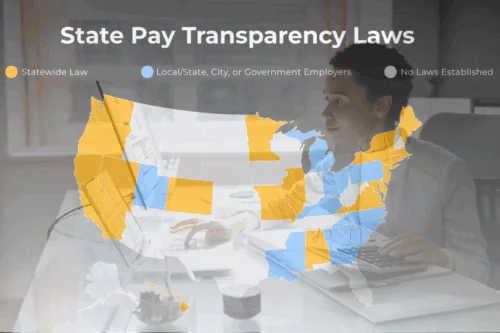Welcome to our comprehensive guide on labor laws in Illinois. If you’re an entry-level job seeker or someone looking to understand your rights and responsibilities in the workplace, this guide is tailored for you.
Navigating the world of employment can be challenging. Understanding labor laws helps protect you against unfair practices and empowers you to make informed decisions about your career. From wage regulations to anti-discrimination protections, we’ll cover everything you need to ensure a safe and equitable work environment.
Whether you’re stepping into your first job or shifting careers, a clear understanding of Illinois labor laws will equip you to advocate for yourself and recognize when your rights are being upheld—and when they’re not. Let’s dive into the essentials of labor laws in Illinois to help you start your career on the right foot.
Understanding Labor Laws in Illinois
For those employed or considering employment in Illinois, grasping the basics of labor laws in Illinois is crucial. These laws protect workers and employers by providing clear guidelines on the mutual obligations involved in employment relationships. Here, we delve into the fundamental aspects of Illinois labor laws.
Minimum Wage Standards
Illinois has set a higher minimum wage rate than the federal standard. As of January 1, 2023, the minimum wage in Illinois is $12.00 per hour for workers aged 18 and over, rising to $15.00 by 2025. Such increments highlight the state’s commitment to enhanced living standards for its workforce. For further details on worker rights and wage standards, visit the Illinois Department of Labor.
Working Hours Regulations
In line with Illinois labor laws, hourly employees are entitled to one day off every seven days. These mandated rest periods strongly support creating a balance between work and life for those in the retail sector, government, or research operations.
Overtime Payments
In Illinois, overtime is calculated for any hours worked over 40 in a single workweek. Employees should receive one and a half times their regular hourly pay for overtime hours. This rule ensures fairness and discourages excessive work hours, promoting a balanced work environment.
Understanding these core components of Illinois’s labor laws will enable employees and employers alike to ensure compliance and foster a fair workplace. The subsequent sections provide other essential labor law insights, such as discrimination laws and job safety.
Key Components of Illinois Labor Laws
Illinois labor laws provide comprehensive protections covering various aspects of employment. Here, we focus on the critical components that every worker and employer should understand.
Employment Discrimination
Under Illinois law, employment discrimination based on race, color, religion, sex, national origin, age, disability, or sexual orientation is prohibited. This inclusivity ensures all individuals have equal employment opportunities. Comprehending these rules lays the groundwork for a respectful and equitable workplace. To explore inclusive employment opportunities, see Opportunities for Inclusion.
Family and Medical Leave
Illinois aligns with the federal Family and Medical Leave Act (FMLA), which allows eligible employees up to 12 weeks of unpaid leave per year for certain family and medical reasons. This ensures job security during significant life events. For specific circumstances and eligibility, visit the Department of Labor.
Worker Compensation
Employees injured on the job in Illinois are entitled to worker’s compensation. This law safeguards workers by providing medical benefits and wage replacement during periods of work incapacity.
Unemployment Benefits
Unemployed workers in Illinois may be eligible for unemployment benefits if they meet specific criteria, such as adequate earnings during the base period and involuntary unemployment. These benefits are a safety net during job transition periods, assuring minimal financial stability.
Understanding these key components of labor laws in Illinois helps secure a fair, safe, and balanced work environment. Following these guidelines will benefit individuals across various industries, fostering a culture of respect and equality.
Wage and Hour Regulations in Illinois
Understanding wage and hour regulations is essential for compliance with labor laws in Illinois. These guidelines ensure that workers receive fair compensation for their time and efforts.
Minimum Wage Details
As previously mentioned, Illinois has set progressive increases in the minimum wage. By 2025, the rate will reach $15 per hour, reflecting Illinois’s commitment to a living wage.
Overtime Rules
Special stipulations apply to certain sectors in addition to the standard overtime rules. These include residential workers, who may have different thresholds for overtime eligibility.
Breaks and Meal Periods
Employees working for 7.5 continuous hours are entitled to a 20-minute meal break, which must occur within the first 5 hours of the shift.
Payroll Recordkeeping
Employers must maintain accurate payroll records for at least three years. This transparency helps protect employee rights and simplifies compliance checks.
Adhering to these wage and hour regulations is a legal requirement and a mark of respect and fairness towards employees. Workers can refer to the Illinois Department of Labor FAQ for more support.
Workplace Safety and Health Standards
Adhering to safety and health standards is a critical component of labor laws in Illinois. These regulations ensure that employees work in safe and healthy environments, preventing accidents and promoting overall well-being.
Occupational Safety Regulations
Illinois follows the Occupational Safety and Health Administration (OSHA) guidelines to provide a hazard-free workplace. Employers must identify potential hazards and implement preventive measures to protect workers.
Health Standards
Health standards include provisions for adequate sanitation, ventilation, and access to clean drinking water at work sites. These measures assure a healthy working environment that supports employee well-being.
Emergency Procedures
Clear and practiced procedures must be in place in case of an emergency. This includes proper signage, emergency exits, and regular drills crucial for employee safety.
Reporting and Addressing Violations
Employees can report workplace safety or health violations without fear of retaliation. If they believe their workplace does not meet health or safety standards, they can file confidential complaints with OSHA.
Ensuring a safe and healthy workplace is foundational to upholding the labor laws in Illinois. This commitment not only prevents physical harm but also boosts morale and productivity in the workforce. For further details on handling specific situations related to discrimination or unfair practices, the next section provides comprehensive insights.
Anti-discrimination Protections in Illinois
Illinois strongly opposes discrimination in the workplace and upholds fairness under labor laws. These protections cover various bases, including race, gender, age, and more.
Protected Categories
The law prohibits discrimination based on:
- Race, color, or national origin
- Religion or creed
- Sex, including pregnancy
- Disability, physical or mental
- Age (40 and older)
- Sexual orientation or gender identity
- Genetic information
Harassment and Workplace Discrimination
Harassment, a form of discrimination, is illegal when it creates a hostile work environment. This includes unwanted remarks or physical gestures based on any of the protected categories.
Filing a Discrimination Complaint
Understanding your rights is crucial for those facing discrimination. Additionally, check out Job Offer guidance to ensure fair treatment in hiring and employment scenarios.
Through robust anti-discrimination laws, Illinois ensures all individuals have equal access to employment opportunities, reinforcing a workplace culture of respect and equality.
Parental and Disability Leave Rights
Illinois supports workers by offering specific rights around parental and disability leave, which is in line with the broader framework of labor laws in Illinois.
Parental Leave
Aligning with the federal Family and Medical Leave Act (FMLA), Illinois allows eligible employees to take up to 12 weeks of unpaid leave for the birth or adoption of a child. This ensures parents have essential bonding time without fear of job loss.
Disability Leave
Employees with disabilities are also entitled to reasonable accommodations, including leave for medical treatment. The Americans with Disabilities Act (ADA) complements state law by ensuring such provisions.
Process for Requesting Leave
To request parental or disability leave, employees should:
- Notify their employer as soon as possible.
- If required, provide necessary documentation, such as medical records or birth certificates.
- Discuss the duration and terms of leave to ensure mutual understanding.
The provision of leave rights under labor laws in Illinois supports not only the welfare of workers but also the productivity and morale of workplaces.
Steps to File a Labor Law Complaint in Illinois
If you believe your rights under labor laws in Illinois have been violated, it is important to know how to file a complaint properly.
Identifying the Violation
First, determine the specific labor law that has been violated. This could involve issues such as unpaid wages, discrimination, or unsafe work conditions.
Filing the Complaint
Complaints regarding wage violations can be filed with the Illinois Department of Labor, while discrimination complaints should be directed to the Illinois Department of Human Rights.
Documentation Needed
Gather all relevant documentation, such as:
- Pay stubs
- Employment contracts
- Emails or communications related to the issue
Seeking Assistance
If you need help with the process, consider seeking advice from a legal expert in employment law.
Filing a complaint is a significant step in asserting your rights and ensuring that labor laws in Illinois are enforced. The Illinois Department of Labor site offers resources and contact information for additional information or assistance.
How Illinois Labor Laws Impact Hiring Processes
Understanding the influence of labor laws in Illinois on hiring can help employers and job seekers ensure compliance and fairness.
Transparent Job Advertisements
Employers must provide clear, non-discriminatory job postings. This includes accurate descriptions of roles and responsibilities.
Equal Opportunity Employment
Under Illinois law, all qualified candidates must be considered without regard to protected characteristics such as race, gender, or age. This promotes diversity and inclusion.
Background Checks
Background checks are permissible, but they must comply with both state and federal regulations to protect applicant privacy.
Interview Practices
It is illegal to ask about certain personal details unrelated to job performance during interviews, including questions about marital status or family plans.
By following the labor laws in Illinois, employers can maintain ethical hiring practices, and job seekers can understand their rights. Being familiar with potential Interview Questions can be significantly beneficial for those preparing for interviews.
FAQs on Illinois Labor Laws
What is the current minimum wage in Illinois?
As of 2023, the minimum wage in Illinois is $12.00 per hour for workers aged 18 and over, set to increase annually until it reaches $15.00 in 2025.
Am I entitled to overtime pay?
Yes, employees in Illinois are entitled to overtime pay of 1.5 times their regular hourly rate for hours worked beyond 40 in a single workweek.
How can I report workplace discrimination?
You can file a complaint with the Illinois Department of Human Rights if you experience discrimination based on race, gender, age, or other protected categories.
What should I do if I’m injured on the job?
Report the injury to your employer immediately, seek medical attention, and inform your employer if you need to file a worker’s compensation claim.
Can I take leave to care for a sick family member?
Yes, under the Family and Medical Leave Act (FMLA), eligible employees can take up to 12 weeks of unpaid leave for serious health conditions affecting them or immediate family members.
These FAQs provide a snapshot of common inquiries related to labor laws in Illinois, offering a quick reference for understanding basic rights and employer obligations.
Conclusion
Employers and employees must stay informed and vigilant to navigate the complexities of Illinois labor laws. By understanding and adhering to the state’s labor regulations, workplaces can foster fair, safe, and inclusive environments.
Now, staying current with these laws is essential for protecting your rights and responsibilities in the workplace. Whether you’re an employee ensuring your workplace complies with safety standards or an employer maintaining fairness in hiring practices, knowledge of these laws supports a thriving work culture.
If you’re seeking job opportunities or need assistance with understanding labor rights, joining Diversity Employment can provide valuable resources and support. With comprehensive guides and the latest job postings, Diversity Employment’s job board helps connect diverse talent with employers committed to inclusive workplace practices.
Join Diversity Employment today and start building a better workplace for tomorrow.




